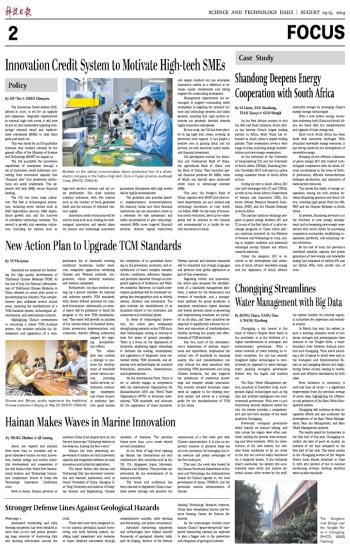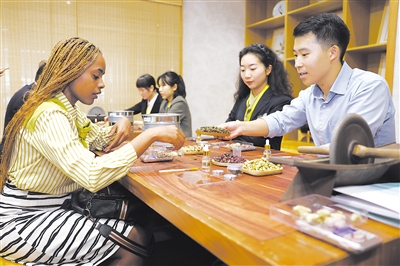
 |
| Chinese and African youths experience the traditional Chinese medicine in Beijing on May 20. (PHOTO: XINHUA) |
Standards are essential for facilitating the high-quality development of Traditional Chinese Medicine (TCM). At the end of July, the National Administration of Traditional Chinese Medicine in China released an action plan aimed at standardizing the industry. This comprehensive plan addresses several crucial areas, including the establishment of a TCM standard system, technological advancements, and international outreach.
Highlighting China's commitment to enhancing a robust TCM standard system, this initiative includes the development and application of a comprehensive list of standards covering traditional treatments, herbal medicine, integrative approaches combining Chinese and Western methods, acupuncture, ethnic minority medicine, and medical equipment.
Furthermore, the plan involves setting up a project database for national and industry-specific TCM standards, with clearly defined priorities for standard formulation. Additionally, an annual report will be published to detail the progress in the new TCM standardization. This report will provide an analysis of the current status of standard formulation, promotion, implementation, and evaluation, thereby offering substantial support for ongoing standardization efforts.
The action plan also outlines a strategy to promote the development of standards across various sectors, including health services, information technology, equipment, and ethnic minority medicine. Specific goals include the completion of 50 guidelines focusing on the prevention, treatment, and rehabilitation of major complex diseases, chronic conditions, infectious diseases, and prevalent disorders through an integrated approach of traditional and Western medicine. Moreover, 20 health intervention guidelines will be developed targeting key demographics such as elderly, women, children, and adolescents. The plan includes the establishment of 30 standards related to the cultivation and conservation of medicinal plants.
In terms of technological innovation, the action plan emphasizes strengthening research on key TCM standard technologies, aiming to develop at least five series of general principles. There is a focus on the digitization of standards, employing digital technology to facilitate the reading, transmission, and application of diagnostic rules embedded within TCM standards, and exploring new methodologies for standard formulation, promotion, dissemination, and implementation.
On the international front, China is set to actively engage in cooperation with the International Organization for Standardization (ISO) and World Trade Organization (WTO) to formulate international TCM standards, and advocate for the application of these standards. Twenty national and industry standards will be translated into foreign languages and promote their global application as part of this cooperation.
Regarding reform and innovation, the action plan proposes the establishment of a standards management platform, a system for the formulation and revision of standards, and a management platform for group standards. A standards consultation expert database and bolster projects aimed at promoting and implementing standards are included in the plan, and these initiatives are expected to significantly advance the reform and innovation of standardization, thereby elevating the quality and effectiveness of TCM standards.
Zhu Gui, head of the administration's department of policies, regulations and supervision, emphasized the critical role of standards in ensuring quality. She said standardization not only reduces the risks associated with consulting TCM practitioners and using Chinese medicine, but also supports the inheritance of traditional knowledge and integrity amidst innovation. The recently released document represents an upgrade to the existing standard system and serves as a strategic guide for the standardization of TCM in the future.


 Next
Next




